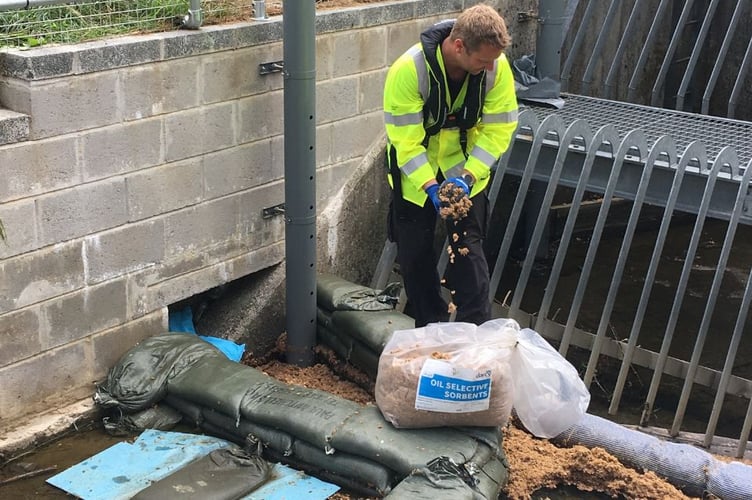COACH company Taw and Torridge Coaches Ltd, was fined £25,500 this week and ordered to pay costs of more than £80,000 after diesel leaked from tanks on its Barnstaple site into the Taw estuary.
In a case brought by the Environment Agency, Mark Hunt, the company’s managing director since 2003, admitted being responsible, but blamed the pollution on a nearby petrol station.

Tests showed the diesel sold there was of a different type from that in the estuary.
Hunt, 46, of Wyatt Cottage, Halspill, Weare Giffard and the company, of Grange Lane Coach Depot, Merton, Okehampton, appeared before Exeter Crown Court on Tuesday, October 15.
The company admitted three charges relating to the pollution incident and Hunt a further two charges.
The company was fined £25,500 for the second charge against it, to be paid within 28 days, ordered to pay prosecution costs of £41,727.99 and remediation costs of £43,100.01. No separate fine was given for the other two charges and the charges against Hunt were ordered to lay on file.
The court heard that the family run business had operated from the depot in Coney Avenue since 2012.
The site already contained an above ground 30,000 litre diesel tank that had two metered fuel pumps connected to the tank via pipework located in a below ground conduit.
The meters had not been calibrated since the company took on the site and no maintenance contract or records exist for this refuelling facility.
Environment officers went there in 2019 following reports of diesel in the Taw estuary.
The oil was traced to a tributary called the Coney Gut diversion channel and from there back to the site.
Diesel was found floating on the surface of groundwater within old oil recovery sumps and wells and a conduit was full of oily sludge.
Agency officers then visited the site daily replacing oil absorbents and monitoring the watercourse. Between two of these visits, the sludge in the conduit was cleaned out and on a subsequent inspection it was found that a screw had been placed in a hole in the pipe in an attempt to seal it.
DENIAL
Hunt denied that the oil came from the site and claimed that it must be from one of the neighbouring sites, such as the filling station.
He stated that the hole in the pipe, in which the screw had been inserted, occurred during the digging out of the oily sludge and had not existed previously when the oil was first seen in the Taw.
However, photographic records show that this was not the case and the screw had been present at the time of the first investigations.
Hunt had the tank and pipework pressure tested, the results of which he presented as proof that the system was not leaking.

However, it was shown that he had sealed around the screw-filled hole with resin prior to the testing being done. The pipework was subsequently replaced. On the pipe’s removal, it was found to be peppered with more small holes.
The diesel refuelling area at the Coney Avenue site where fuel pipes are in the ground, surrounded by oily gunk. It was here that diesel leaked into the ground.
Oil continued to leak into the Coney Gut throughout July and into August. Hunt was informed he needed to get specialist assistance to deal with the contaminated ground, which was the source of the oil. He resisted doing so, arguing that the oil was not from the site.
Sample analysis showed that the diesel at the filling station was different from that in the site’s tank, the sumps and the river.
Hunt continued to deny he had lost any diesel from his tank and maintained his records proved this.
An Anti-Pollution Works Notice was served on the defendants, requiring them to carry out remediation works recommended by a clean-up company.
The company employed contractors to set up a ground water remediation system which recovered thousands of litres of diesel.
However, when the insurance money ran out, Hunt did not continue to use the contractors as recommended in their report.
Subsequently, it was found in April 2021 that there was still a possibility of diesel leaking from the ground surrounding the coach depot.
‘THE FINE MUST HIT HOME’
Hunt attended a tape-recorded interview with the Environment Agency in which he continued to deny that the oil was from the site and still pointed the finger at others.
When asked why he had not had fuel pump meters calibrated to ensure he knew exactly how much oil was being taken out of the tank, he replied that he did not need to because he was not selling it. He felt there was no point in spending money if he did not have to.
In sentencing, Judge H.H.J. Adkin said an expert’s report suggested more than 1,000 litres of diesel had escaped over time and that there had not been adequate work to remediate the contamination. He said the company was “rich” with a large profit margin and the fine must hit home.
Andrew Fuller of the Environment Agency said: “Mr Hunt consistently denied any wrongdoing even when the evidence was stacked against him and his company.
“Clearly, the environmental risk posed by the company’s activities, and, in some cases, lack of activity, was of no concern to him.”




-and-one-of-Bearslake-Inns-ownerdirectors-Lisa-Jenkins.jpeg?width=209&height=140&crop=209:145,smart&quality=75)